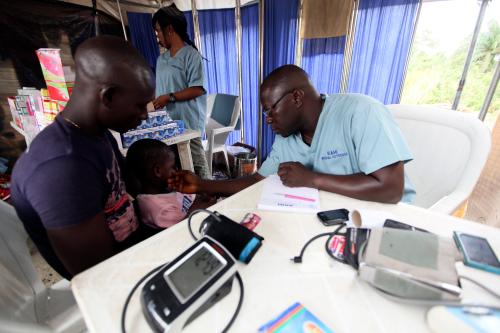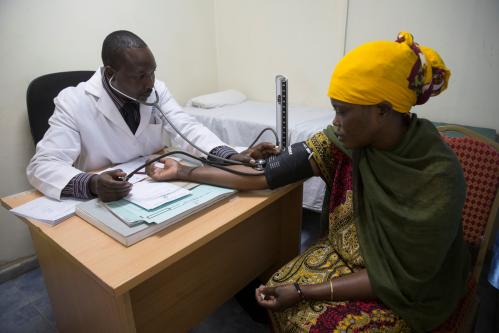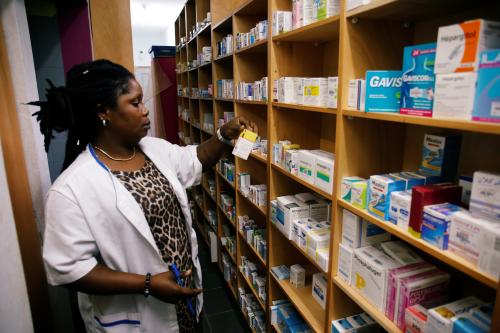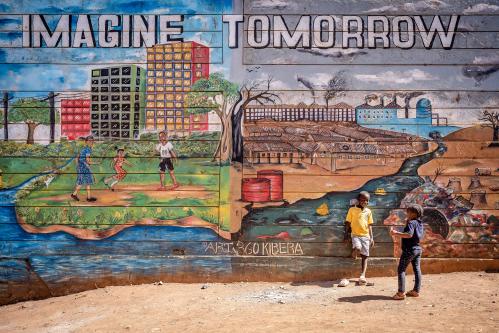Despite increasing threats to multilateralism, the G-7 countries assemble August 24-26 in Biarritz, France, with the fight against inequality at the core of this year’s priorities. In a bid to forge a renewed partnership with the developing world, African partners are also invited to the table. This is a welcome focus, particularly for global health, where the last two decades of international cooperation have been instrumental in mobilizing global resources to combat epidemics and save millions of lives.
Yet the world is changing, the global health landscape has dramatically evolved, and the international order is shifting amid technological and demographic forces. The challenge, in our deeply interconnected world, is how the current power players reframe global priorities to be more inclusive, more sustainable, and more equitable, thus offering the best chance at a peaceful coexistence between those who have and those who seek.
As leaders gather in Biarritz this month, they should consider five priorities for health in Africa:
- Mobilize financial resources and align funding mechanisms with the Universal Health Coverage (UHC) agenda. The global consensus on health care is to promote universal access to quality, affordable care—the basis for Sustainable Development Goal 3. However, in many developing countries, progress is either stalled or off track in part because the existing funding mechanisms are fundamentally misaligned with UHC. First, there is an urgent need for greater mobilization of domestic and private sector resources, and creation of innovative financing mechanisms to address the health care financing gap. Second, and perhaps more importantly, because donor institutions constitute a significant portion of the health care budget in recipient countries, it is imperative that the donor funding is aligned with country-specific objectives, such as restructuring health systems and primary care provision. This strategy requires system-level investments in health infrastructure, human resources, health information systems, consumables, financing, and governance. As the G-7 mobilizes partners to replenish funding of multilateral institutions, including the Global Fund this year, it is equally important to evolve away from the hitherto predominantly humanitarian prism and towards an integrated approach to patient-centered care with a progressively greater share of funding invested in building sustainable health systems.
- Focus on sustainability by coinvesting and promoting predictable, transparent, and accountable paths to donor withdrawal. The economic case for investing in health is straightforward—a healthy, productive population is the engine that drives economic growth, peace, and prosperity on a national and global scale. As countries develop and health care performance improves, progressive donor withdrawal should be foreseeable within a long-term strategic framework that places national health systems on the path to sustainability. Public-private-community partnerships on strategic initiatives such as the building and maintenance of health posts in Rwanda or the public-private cofinancing of vaccines in Senegal are successful early examples of innovative coinvestment models that empower local communities and national systems, respectively, to take ownership of their health care agenda.
- Leverage African partners into a coalition and catalyze the sharing of innovative solutions and best practices. The bedrock for implementing durable solutions that place health as a national priority within the existing structural, economic, and political nuances is to let Africans drive the process. Ethiopia, with a population of over 100 million, has built a successful community-based care system that has led to a dramatic drop in infectious diseases and maternal and infant mortality, optimized task-shifting between health centers and the community, and placed the country on track to meet many of its key health targets. Rwanda, with vaccination rates of over 90 percent, is likely to be the first country in the world to eliminate cervical cancer, the fourth most common cancer in women. Across the continent, innovative solutions are eliminating bottlenecks in care delivery and medical supply chains, addressing drug resistance, designing e-health systems, and improving financial access to care. Countries that successfully implement progressive health reforms despite their resource-constrained environments could constitute an “incubator of solutions” to be deployed and scaled—including in resource-rich environments—to cut costs and improve point-of-care access, as well as to be catalysts for a broader global movement sharing best practices. As a financial partner and stakeholder, the G-7 should be an ally nudging this framework towards success.
- Defend health as a human right and fight against gender and sexual inequalities. Increasingly, citizen movements are demanding the recognition of health as a human right and equitable access to care for marginalized populations. Botswana, which has adopted a distinctly human-rights-driven approach to health care, views the recent recognition by their courts of the rights and dignities of sexual minorities as a trampoline to improving access to care for high-risk groups that have been traditionally sidelined, despite their disproportionately high disease burden. Gender-sensitive approaches to health care in Ethiopia and Rwanda have shown great success in dissolving social, economic, and gender disparities in accessing care. As the G-7 launches a global reflection on gender equality and human rights, emphasis should be put on countries that are at the forefront of responding, support for civil society groups that come together to defy restrictive norms, and the integration of gender equality into the architecture of global health.
- Accelerate the response to epidemics. The current Ebola epidemic in the Democratic Republic of the Congo (DRC), the second-worst on record, has lasted over a year, already claiming 1,800 lives. The disease has spread, with two cases reported in neighboring Uganda and three cases reported in Goma—a major transport hub at the DRC-Rwanda border—finally triggering WHO classification as a public health emergency of international concern. For now, ending the outbreak appears dependent on the mobilization of international partners, who, by all reasonable accounts, have been slow to act. The prevailing logic requiring dramatic escalation of an epidemic and international transmission in order to trigger global action is fundamentally flawed and a stark reminder of the gaps in international solidarity. The G-7 ought to coalesce around timely action and concerted efforts to tackle this crisis. For long-term sustainability, there must be coordination of the humanitarian response with the bordering countries and the Africa Centers for Disease Control and Prevention.
This year, conditions seem unified for a significant departure from outworn practices and a shift toward addressing pressing issues at the root of today’s anxieties. There is a unique—yet fleeting—opportunity to reset the African health agenda and get back on the path to sustainable development.
Note: This blog reflects the views of the authors only and does not reflect the views of the Africa Growth Initiative.










Commentary
Health in Africa: 5 priorities for the G-7 Biarritz Summit
August 19, 2019